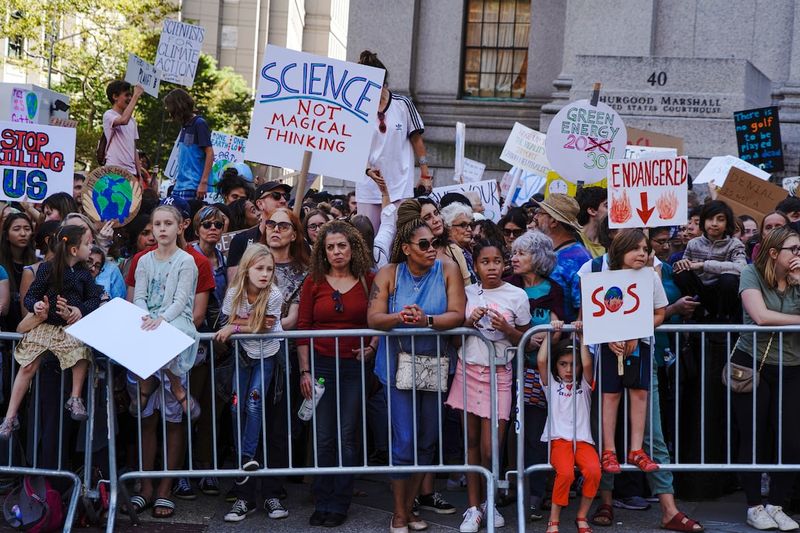Climate Crisis: Greta Thunberg forcibly removed from climate protest after fine
Published On 24 Jul 2023
Introduction
Climate activist Greta Thunberg has been forcibly removed by police from a protest in the southern Swedish city of Malmo, hours after a local court fined her for disobeying a police order during a similar protest last month. Thunberg, 20, who became the face of young climate activists worldwide after staging weekly protests in front of the Swedish parliament, admitted during the court proceedings on Monday that she had disobeyed the police order but pleaded not guilty and said she was acting out of necessity.
Standing Up for Climate Change
In recent years, Greta Thunberg has emerged as a prominent figure in the fight against climate change. Her determination to raise awareness and demand action from world leaders has sparked a global movement of young activists. Thunberg’s repeated acts of civil disobedience have garnered attention and support, but also encountered legal consequences.
Disobeying the Law out of Necessity?
During the court proceedings, Thunberg openly admitted to disobeying a police order to leave a protest. However, she argued that her actions were justified by the urgency of the climate crisis. Thunberg believes that the laws and regulations in place are insufficient to address the magnitude of the problem, and that direct action is sometimes necessary to bring about meaningful change.
The Philosophy of Civil Disobedience
Thunberg’s case raises important philosophical questions about civil disobedience and its role in social activism. Philosophers like Henry David Thoreau and Mahatma Gandhi have historically advocated for civil disobedience as a morally justifiable approach to challenge unjust laws or policies. Thoreau argued that individuals have a responsibility to act in accordance with their conscience, even if it means breaking the law. Gandhi believed that nonviolent resistance could expose the injustice of oppressive systems and inspire change.
The Power of Symbolic Protest
Thunberg’s weekly protests in front of the Swedish parliament, as well as her participation in larger demonstrations, have served as powerful symbols of youth engagement and urgency in the face of the climate crisis. By openly defying authorities and putting herself at risk of legal consequences, Thunberg has kept the issue in the public eye and sparked conversations on a global scale.
The Debate on Climate Activism
Thunberg’s resilience and determination have not gone unnoticed. However, her tactics and confrontational approach have sparked a heated debate among experts and policymakers. Some argue that her actions are necessary to draw attention to the urgency of the climate crisis, while others criticize her for disregarding established norms and the rule of law.
Conclusion
Greta Thunberg’s recent experience of being forcibly removed from a climate protest and facing legal consequences highlights the complexities of climate activism. While her actions have undoubtedly brought attention to the pressing issue of climate change, they also raise challenging philosophical and ethical questions about civil disobedience. As the global community grapples with the severity of the climate crisis, it is crucial to find a balance between protest and constructive engagement with the existing legal and political systems. Only by working together can we hope to address the urgent challenges facing our planet.
Source: News Agencies

<< photo by Katie Rodriguez >>
The image is for illustrative purposes only and does not depict the actual situation.
You might want to read !
- Former Viking DE Everson Griffen Faces DWI Charges: Examining the Consequences of Off-field Behavior
- No-Sleep Thriller: Greuther Furth and Liverpool Battle to 4-4 Draw in International Clash
- Title: Exploring the Implications of Al Hilal’s Record-Breaking $332 Million Bid for…
- “A Sacred Memorial: The Creation of a National Monument for Emmett Till’s Legacy”
- Selena Gomez Reflects on Turning 31: A Birthday Wish Revealed
- 10 Fascinating Facts About Albert Einstein: Unraveling the Little-Known Side of the Brilliant Scientist
- “Unleashing the Claws: Doja Cat Takes on Fans Calling Themselves ‘Kittenz’ and Fan Pages”
- “Netanyahu’s Health Woes Intensify as Israel’s Judicial Reform Vote Looms”
- Gigi Hadid’s Marijuana Scandal: Exploring Celebrity Responsibility and Legal Consequences
- The Potential Legal Consequences for Trump’s Mar-a-Lago Case as He Struggles to Find New Lawyers




